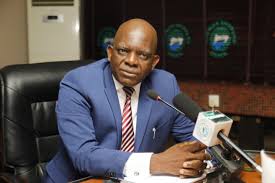
The Council for the Regulation of Freight Forwarding in Nigeria (CRFFN) was conceived in 2007 as a possible solution to the myriads of problems which had militated against freight forwarding and logistics practice in Nigeria.
Without fear of being contradicted, one can say that, since its creation, the CRFFN has not enjoyed peace. At different times, it has had to contend with freight forwarding associations and individual freight forwarders; it has also had to contend with Government and its functionaries, at different times. It has been bruised and beaten severally to a pulp.
At a point in its history, we had thought that all the past troubles and hurdles had been scaled, especially after it got its governing council members and had a substantive Registrar in the person of Barrister Sam Nwakohu.
With a governing council and commencement of collection of Practitioners Operations Fees (POF), stakeholders had thought that peace and corporate governance had returned to the Council. But how wrong we all were.
Two main issues have crippled the CRFFN. One is that since the exit of Mr Nwakohu in January 2023 as the Registrar, the CRFFN has had to make do with an acting Registrar, in the person of Mrs Chinyere Uromta. Second is the exclusion from federal budgetary provision.
No doubt, Mrs Uromta has been battling to keep CRFFN’s head above water sine she took over. Even while she was struggling to ensure that the Council did not die, it was affected by the Federal Government directive that some agencies that were hitherto enjoying budgetary allocation would cease to enjoy the privilege. In addition, those that are generating revenue would part with 50 per cent of their revenue to be paid directly into the federation account.
Before the directives, there were two sources of revenue for the Council, the budgetary allocation and collection from the Practitioners Operating Fees (POF), which is payable by freight forwarders on cargoes cleared by them.
Since these two actions became effective, the CRFFN has been in a dilemma of payment of staff salaries. There has been no payment since sometimes in 2023.
It is this situation that made the acting Registrar to seek the support of the Maritime Workers Union of Nigeria (MWUN). At her visit to the union, Uromta pointedly blamed the Council’s removal from federal budgetary allocations as the primary reason for its inability to pay workers’ salaries for many months.
The President General of MWUN, Comrade Adewale Adeyanju in response, also expressed worry over the unpaid salaries of CRFFN staff, while voicing serious concerns over the ongoing financial and governance challenges at the Council.
Prior to her visit, representatives of the workers in CRFFN had ran to the MWUN, to be unionized. They were eventually unionized under the Shipping, Clearing & Forwarding Agencies Workers branch.
To justify the new relationship, the union threatened to go on strike, and before the expiration of the ultimatum, a response came. The threat actually worked, because last week, some arrears of salaries were paid to employees of the CRFFN.
In reaction, the President General of MWUN was full of praises to the Minister of Marine and Blue Economy, Mr Adegboyega Oyetola, for wading in and seeing to it that the money was paid.
This development is apparently a plus in the new romance between the union and the CRFFN. But it also begs some questions. Where did the money that was paid come from? Similarly, will the outstanding be paid, and when.
Answers to these will assist to predict what the future may likely hold for the CRFFN. The payment has once again confirmed that CRFFN is indeed a government agency, but an agency that lacks support and empathy of the government. It is apt to affirm that were it not for the threat from the MWUN, the Ministry would never have cared a hoot about what is happening to the CRFFN, after it was stripped of its lifeline.
Having said this, if there is anything that is worrisome at the CRFFN, it is its lack of financial transparency, especially as it concerns accruals from the POF. Not only is there so much secrecy about it, the Council has also failed to remit what is due to declarants, that is the freight forwarders who clear cargoes for which the POF is collected.
Many stakeholders have kicked against the fact that the MWUN has unionized the CRFFN. While we may not agree with their positions, it is also a known fact that workers union are always interested in expanding their kingdoms.
What the MWUN did is not out of place. It has only come to the rescue of both the workers and the management of CRFFN. But this is a testy relationship in which the union must put its thinking cap on. Is unionising CRFFN and the check-off dues that will come into the coffers of the union, worth the trouble that is ahead. Can the union ensure that the management of CRFFN is accountable for all that comes into its coffers, can the union ensure that the management of CRFFN is committed to paying part of the POF collections to the declarants (freight forwarders), can the union ensure that there is constant flow of revenue into the coffers of the CRFFN, and the union ensure that there is good corporate governance structure emplace at the CRFFN?
The above posers will determine the extent of success or otherwise and the sustainability of the relationship between the duo.
There are two principal issues that need to be dealt with before the Council can stabilise, especially now that it no longer enjoys budgetary allocations from the government.
The CRFFN needs to win the confidence of its immediate stakeholders; the freight forwarders. This can start by being accountable with the POF.
It must also strive to have a substantive Registrar, as well as a governing council. These two will made the Council to be corporately responsible and accountable.
Finally, we urge the MWUN to thread carefully in its romance with the CRFFN, otherwise, it will get its fingers burnt and lose the credibility that it currently enjoys.
Rather than the stop-gap measure adopted by the MWUN, there is need for a holistic and comprehensive appraisal of the issues bedeviling the CRFFN, so as to finally restore the council’s effectiveness and relevance.
Yes, the romance is borne out of need to survive of the part of CRFFN. However, a corporately irresponsible CRFFN is a baggage that the union must not carry; going forward, unless the relationship is well articulated beyond just unionism and expansionism.















